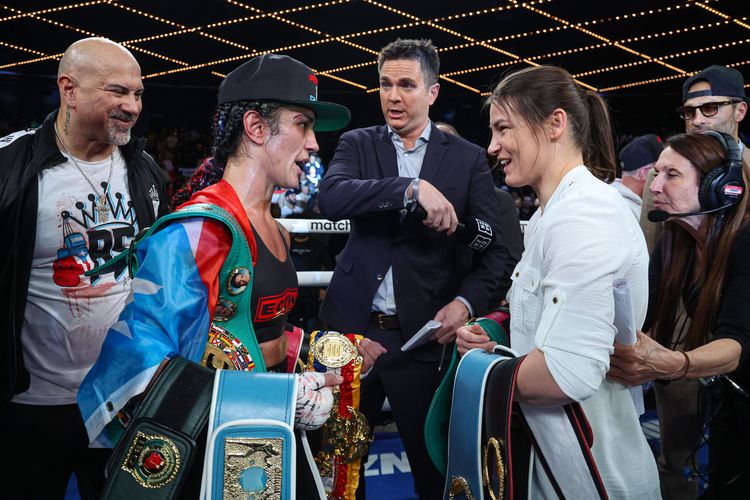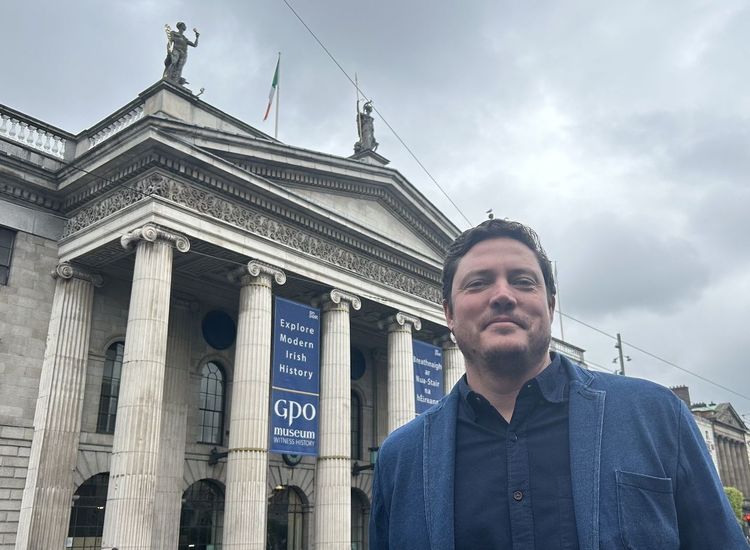JFK during his first election campaign in 1946 with his father Joseph Kennedy and his maternal grandfather John Fitzgerald, the former mayor of Boston and congressman known as “Honey Fitz.” JOHN F. KENNEDY PRESIDENTIAL MUSEUM AND LIBRARY, BOSTON
By Peter McDermott
“Look after one another” is a phrase you hear from Irish elders. It refers to the family, rather than a broader tribe. It means: as the family grows to adulthood, the siblings should stay close and display a united front to the world. It’s about loyalty and solidarity. The Kennedys managed this well and it is one of the most appealing things about the family.
Not that the Bushes, for example, have ever been disloyal to each other in public, but their careers seemed more a result of individuals’ ambitions rather than a family project. Both families, though, for all their flaws, seem like TV’s “The Waltons” of old when compared to the most powerful clans in contemporary politics – the hugely dysfunctional Kochs being a case in point. Texas native Fred Koch Sr., who worked in both Nazi Germany and Stalin’s Soviet Union, discovered “liberty” at some point and helped found the far-right John Birch Society in the 1950s. He encouraged his sons not into public service but more money making, which anyway they believed to be the same thing. Two sons took over the family business, and the other two sued them.
Koch Industries has been sued by lots of people, but perhaps most notably by the father of recent high-school graduate Danielle Smalley after she and a friend burned to death due to a corroded, leaking Koch pipeline exploding. In 1999, Koch Industries were found “not just guilty of negligence but of malice, too” (according to Jane Mayer in “Dark Money”) and the court awarded the father not the $100 million he’d sued for but $298 million.
The aggressive and apparently amoral Kochs were joined by some other billionaire families with roots in the John Birch Society and other far-right groups to wield enormous clout in the political sphere. These are the people who obsessively, secretly and quite successfully have molded American politics more to their liking. For decades before the Supreme Court loosened campaign-financing laws, favorable tax laws allowed the superrich to help bankroll people like Rush Limbaugh as well as the right-wing foundations and think-tanks that have spent years trying to undo “socialist” programs such as Social Security, Medicare and Medicaid.
That story contrasts with Joe Kennedy, who having become extremely wealthy, pushed his children into public service. One son died a war hero, two were assassinated at the pinnacle of political life and the fourth is considered one of the most effective senators in U.S. history. There were other tragedies: his first-born daughter’s lobotomy (following medical advice of the time) was a terrible failure and his second girl was killed in a plane crash. His third, though, founded the Special Olympics, while the youngest daughter served as an ambassador to Ireland.
We might reasonably ask why the achievements of Kennedy’s children aren’t regarded with more balance and through a patriotic lens. One factor is that the Kennedys have been victims, as well as beneficiaries, of what New Yorker writer John Cassidy has called the “entertainment industrial complex.” The other is the “vast right-wing conspiracy,” to use Hillary Clinton’s inelegant phrase. The post-Bircher right-wing is primarily interested in corporations’ bottom line, and so the Kochs, for instance, challenge regulatory government and climate science. But, as a consequence, we now have a politics where everything must be contested and undermined, from Medicare to the Kennedys to the Clintons to everyone else’s patriotism. Both factors, the EIC and the VRWC, help explain some of the most enduring Kennedy myths. Here are four of the most important and most interesting of them.
- The 1960 Election was stolen in Chicago’s wards
An elderly Irish woman in Indiana, the oft-told tale has it, stipulated in her final will and testament that she be buried across the Illinois state border so she could continue to be of service to the Democratic Party after her passing.
It’s not such a leap for American folklore to accept John F. Kennedy being a beneficiary of such commitment to the cause. Thus for example, the 1960-set first season of the TV series “Mad Men” (2007) has pro-Republican advertising executives buying into the idea of Chicago’s dead voting, decisively, for the Democratic victor.
The city was run from 1955 through 1976 by the last of the old-time Democratic bosses, Mayor Richard M. Daley. An aide once said that Daley’s idea of affirmative action was “nine Irishmen and a Swede,” and he most certainly liked the idea of a Kennedy in the White House.
The problem was Nixon would have had to win Texas, too, and Daley could not have arranged his defeat there. He lost by 24,000 and you can be sure that the GOP, a rising and well-financed force in that state by 1960, had been keeping a very close eye on Landslide Lyndon (an ironic nickname LBJ earned after his rather suspicious 87-vote majority in the 1948 Senate election).
The real myth here is that the defeated Republican decided to move on gracefully, when in fact his party aggressively challenged the result under the radar. It got nowhere in the courts, however.
Gangsters are also mentioned in these stories; but academic historian David Nasaw, the author of “Patriarch” (2012), has said that that Kennedy underperformed in Chicago wards where mob influence was strongest. That’s perhaps not surprising given his high-profile support for brother Bobby’s war on mobbed-up unions and organized crime, one that intensified after the latter became attorney general.
Ultimately, the “stolen election” argument falls back on a perfect-crime scenario: Daley could steal it if he had wanted to, and you’d never know it.
- JFK was really a conservative
In the play, and later the film, “The History Boys,” a state school hires a special tutor for bright working-class and lower-middle class boys. His task is to prepare them for their upcoming Oxbridge interviews. The way to stand out and impress, he coaches them, is to devise contrarian or unorthodox positions. Playwright Alan Bennett’s actual target is a certain type of historian as TV pundit, all flash and no depth.
In 21st century America, there is money in punditry and the shallow contrarian argument, particularly if it suits a right-leaning position. So, for instance, it doesn’t matter how often serious economists and historians take down the view that Kennedy’s tax-cut proposal in 1962 was a forerunner to Reaganomics (indeed it was precisely the opposite), it continues to get repeated time and again. It’s just too useful politically.
More generally, it should be said, JFK’s political stances and speeches were not just within the Democratic mainstream, they helped create and shape the party that it became later.
- Joseph P. Kennedy was a bootlegger during Prohibition
Although it’s widely believed, this is the myth that makes no sense. It appears to be an urban legend dating from after the sons’ assassinations and Kennedy’s own death in 1969. Historian David Nasaw, the author of “The Patriarch,” could only find a single instance of the charge being mentioned while Joe Kennedy was alive, and that was in a Southern newspaper during his son Jack’s 1960 presidential campaign. It seems strange that it wasn’t made more often given that he was from an ethnic group known to be strongly opposed to Prohibition, that his father Patrick was an importer of liquor when it was legal and his immigrant grandmother had been in the business of selling alcohol, that he himself imported the finest whisky from Scotland following repeal and that he was so thoroughly disliked in certain circles.
Likewise, experts such as Daniel Okrent, author of “Last Call: The Rise and Fall of Prohibition,” have never found any contemporaneous references to Kennedy as a bootlegger. Nasaw did find a Joseph Kennedy Ltd. involved in the business of smuggling liquor, but the owner was a Canadian whose given names were Daniel Joseph.
And Nasaw points out that the Massachusetts Kennedy who made his fortune buying and selling companies in Hollywood was twice background-checked for federal jobs in the 1930s and once again in the 1950s. The historian said that Kennedy would have been far too shrewd to have involved himself with criminal activity.
Nasaw, who doesn’t hold his punches when calling out Joe Kennedy’s disastrous diplomatic career, told this newspaper in 2012 that “he was not a bootlegger in any way, shape or form.”
- America’s war in Vietnam began when JFK sent military advisors.
The late foreign policy expert William Pfaff wrote in the New York Review of Books some years ago: “President Kennedy had repeatedly asserted privately that a guerrilla war could not be won by foreign troops, even in large numbers. Eventually, foreign troops go home, he said; the guerrillas stay. No lasting ‘victory’ is possible for the foreigners.”
Pfaff said that it was now beyond debate that Kennedy would “would have withdrawn the still-limited number of troops” from Vietnam.
JFK is tied to the war because he handpicked what journalist David Halberstam called “The Best and the Brightest,” those who pursued the war under LBJ. But the actual testimonies and papers of those brilliant technocrats revealed later in life that JFK’s view about Vietnam was radically different from LBJ’s.
David Kaiser, formerly a professor of the United States Naval War College, wrote in Time magazine essay last week that he found when researching the Vietnam War that “Kennedy had repeatedly refused to intervene massively in Southeast Asia.”
“The more we learn about [Kennedy’s presidency],” prominent presidential historian Tim Naftali wrote at Slate.com this past weekend, “the more impressive he becomes.”










